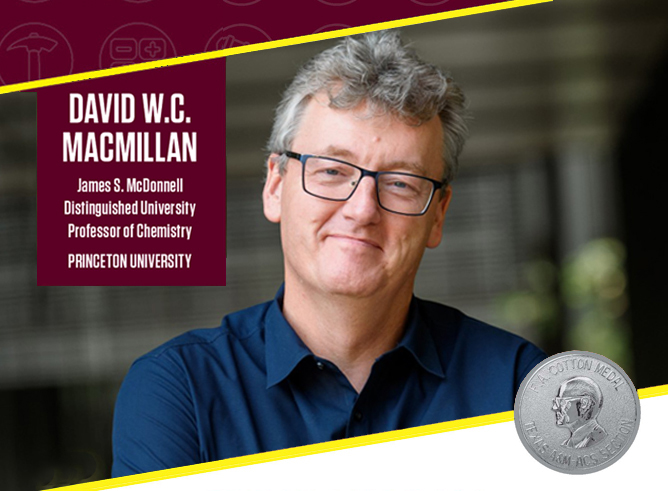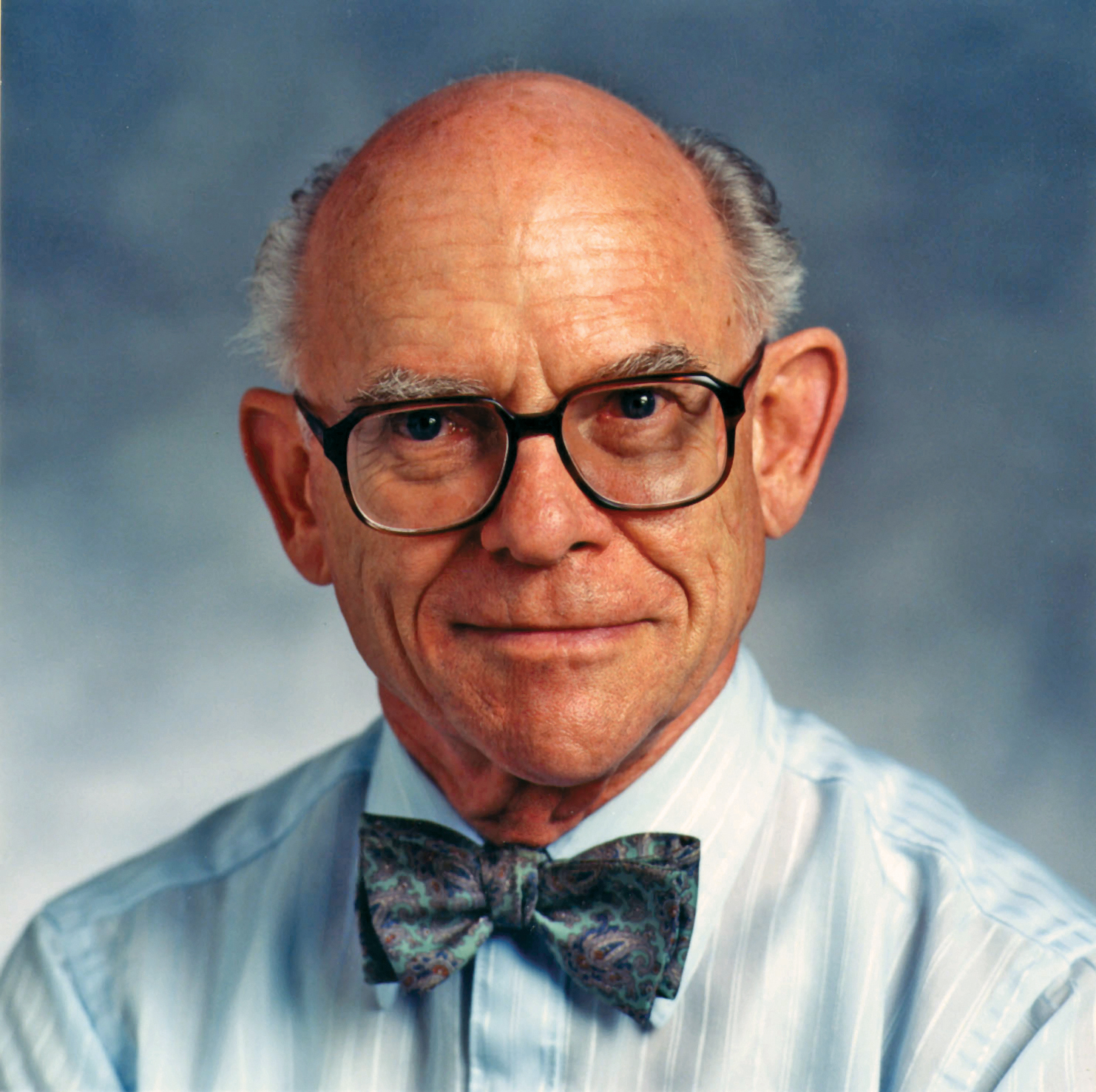
Dr. David W.C. MacMillan, James S. McDonnell Distinguished University Professor of Chemistry at Princeton University, has been selected as the 2024 recipient of the F.A. Cotton Medal for Excellence in Chemical Research named for one of the most honored faculty members in Texas A&M University history.
The medal is jointly awarded each year by the Texas A&M Department of Chemistry and the Texas A&M Section of the American Chemical Society (ACS) in tribute to Dr. F. Albert Cotton, a Texas A&M distinguished professor of chemistry widely considered one of the world’s foremost inorganic chemists who passed away on February 20, 2007. He was the inaugural recipient of the medal when it was first awarded in 1995.
MacMillan will be honored during an afternoon symposium set for Friday, April 26, within the Stephen W. Hawking Auditorium on the Texas A&M campus. In addition to MacMillan’s 4:30 p.m. keynote presentation, the event will feature preceding talks by University of California, Berkeley, chemist Dr. Christopher J. Chang and University of Wisconsin-Madison chemist Dr. Tehshik P. Yoon. The symposium will be followed by an invitation-only dinner, at which MacMillan will be presented with the Cotton Medal.
MacMillan won the 2021 Nobel Prize in Chemistry for his pioneering work in asymmetric organocatalysis, a process that uses small organic molecules to catalyze, or drive, chemical reactions for use in constructing new drug therapies and other materials. He shares the prize with German chemist Benjamin List and used his half of the proceeds to create The May and Billy MacMillan Foundation to honor his parents and fund educational programs for financially disadvantaged students in his native Scotland. MacMillan was elected to the National Academy of Sciences in 2018 and is a fellow of both the Royal Society of Chemistry (RSC) and the American Academy of Arts and Sciences.
Prior to moving to Princeton as the then-A. Barton Hepburn Professor of Chemistry in 2006, MacMillan was the Earle C. Anthony Chair of Organic Chemistry at the California Institute of Technology (2000-2006). He began his independent career at the University of California, Berkeley (1998-2000) after earning his Ph.D. from the University of California, Irvine, in 1996 and completing postdoctoral study at Harvard University (1996-1998). He was born in Bellshill, Scotland, and knighted by both Queen Elizabeth II (July 2022) and King Charles III (February 2023) at Buckingham Palace.

Cotton came to Texas A&M as the Robert A. Welch Distinguished Professor of Chemistry in 1972 from MIT, where at age 31 in 1961, he had become the youngest MIT faculty member to attain the rank of full professor. His pioneering 35-year career at Texas A&M revolutionized several fields of chemistry, including inorganic chemistry, protein chemistry, structural chemistry and chemical bonding. Cotton was the originator of and leading authority in the field of compounds containing single and multiple bonds between metal atoms. His other principal contributions dealt with protein structure, spectroscopic studies of metal carbonyls, and the dynamic behavior of fluxional organometallic and metal carbonyl compounds.
MacMillan's research interests and that of his group at Princeton focus on the development of new areas in organocatalysis, photoredox catalysis and microenvironment mapping. A number of reactions and catalysts developed within his laboratories have been employed throughout the pharmaceutical, agrichemical and fragrance industries, and to date, his studies have been cited in excess of 53,000 times. MacMillan helped launch the international journal Chemical Science, serving as its editor-in-chief from 2009 to 2014, and is a past chair of the National Institutes of Health Study Section for Synthetic and Biological Chemistry (2014-2017).
To date, MacMillan has co-founded two companies — Chiromics LLC and Dexterity Pharma LLC — focused on new strategies and screening techniques for the identification of drug-like molecules. He also directs the Princeton Catalysis Initiative, which conducts collaborative research with several societal impact companies, including Merck, Pfizer, BMS, Janssen, Genentech and GenMab, and has brought more than $100 million in external research funding to Princeton.
In addition to serving as a scientific consultant with Pfizer, Merck, Amgen, Biogen Biopharma, Abbvie Research Laboratories, Johnson & Johnson Pharmaceuticals, Takeda Pharmaceuticals and Gilead Research Laboratories, MacMillan is a member of the scientific advisory boards of Firmenich (Switzerland), Rapport Therapeutics (Boston) and Isomorphic Labs (London) as well as a permanent member of the Research Strategy Review Committee at Merck Research Laboratories.
Beyond the 2021 Nobel Prize, MacMillan has received numerous awards, including the Chirality Medal (2022); RSC Centenary Prize (2020); Nagoya Medal, Japan (2019); American Chemical Society (ACS) Somorjai Catalysis Award (2018); Noyori Prize, Japan (2018); Janssen Pharmaceutica Prize, Belgium (2016); Max Tischler Prize, Harvard (2016); Ernst Schering Award in Biology, Chemistry and Medicine, Germany (2015); ACS Harrison Howe Award (2014); NJ ACS Molecular Design Award (2014); ACS Award for Creativity in Synthesis (2011); Mitsui Catalysis Award, Japan (2011); ACS Cope Scholar Award (2007); ACS EJ Corey Award (2005) and the Corday-Morgan Medal (2005).
"David MacMillan’s research has revolutionized how organic chemists, especially in the pharmaceutical industry, synthesize molecules through catalytic processes," said Texas A&M chemist Dr. Quentin Michaudel. "His seminal contributions to the field of asymmetric organocatalysis — a method that mimics enzymatic reactions with simple organic molecules — earned him the Nobel Prize in Chemistry in 2021. More recently, his research group has pioneered the use of photoredox catalysis, which allows the efficient forging of bonds in drug-like molecules using metal catalysts activated by light. He is most deserving of the Cotton Medal, and his lecture will undoubtedly be memorable for all in attendance."
For more information about the event, contact Texas A&M Chemistry at (979) 845-9829 or via email at chemhead@chem.tamu.edu.

